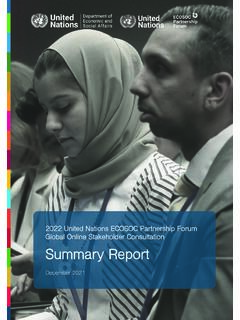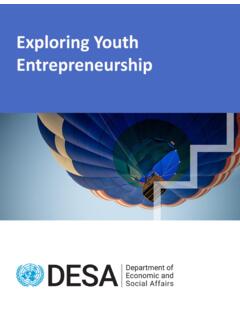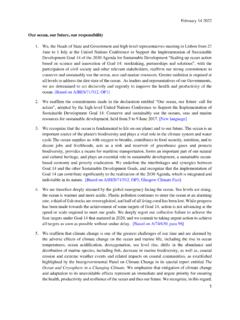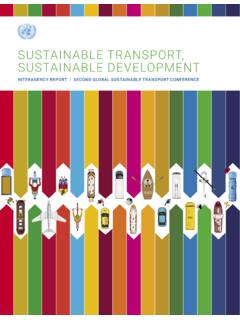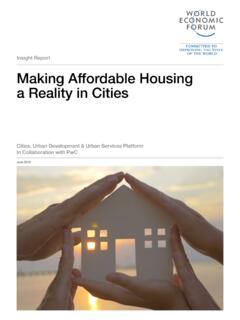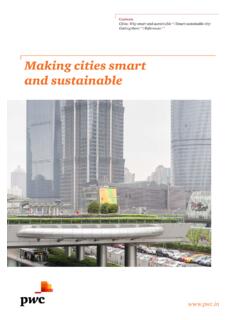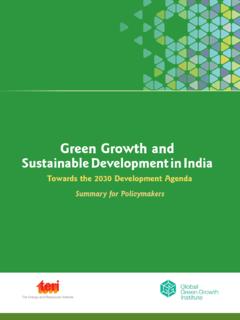Transcription of Micro-, Small-, and Medium-Enterprises (MSMEs) and their ...
1 Contents I. Introduction ..Error! Bookmark not defined. II. Analysis role of MSMEs in fulfilling the SDGs ..Error! Bookmark not defined. Goal 1. End poverty in all its forms everywhere . 4 Goal 2. End hunger, achieve food security and improved nutrition and promote sustainable .. Error! Bookmark not defined. Goal 3. Ensure healthy lives and promote well-being for all at all ages..Error! Bookmark not defined. Goal 4. Ensure inclusive and equitable quality education and promote lifelong learning opportunities for all .. 10. Goal 5. Achieve gender equality and empower all women and girls..Error! Bookmark not defined. Goal 6. Ensure availability and sustainable management of water and sanitation for all .. 14. Goal 7. Ensure access to afforadble, reliable, sustainable and modern energy for all .. 16. Goal 8. Promote sustained, inclusive and sustainable economic growth, full and productive employment and decent work for all.
2 Error! Bookmark not defined. Goal 9. Build resilient infrastructure, promote inclusive and sustainable industrialization and foster innovation..Error! Bookmark not defined. Goal 10. Reduce inequality within and among countries..Error! Bookmark not defined. Goal 11. Make cities and human settlements inclusive, safe, resilient and sustainable .. 24. Goal 12. Ensure sustainable consumption and production patterns..Error! Bookmark not defined. Goal 13. Take urgent action to combat climate change and its impacts..Error! Bookmark not defined. Goal 14. Conserve and sustainably use the oceans, seas and marine resources for sustainable ..Error! Bookmark not defined. Goal 15. Protect, restore and promote sustainable use of terrestrial ecosystems, sustainably manage forests, combat desertification, halt and reverse land degradation and halt biodiversity !
3 Bookmark not defined. Goal 16. Promote peaceful and inclusive societies for sustainable development, provide access to justice for all and build effective, accountable and inclusive institutions at all levels..Error! Bookmark not defined. Goal 17. Strengthen the means of implementation and revitalize the global partnership for sustainable development.. Error! Bookmark not Bibliography ..Error! Bookmark not defined. Micro-, Small and Medium-sized Enterprises (MSMEs) and their role in achieving the sustainable Development Goals This paper was prepared under the project supported by the 2030 Agenda for sustainable Development Sub-Fund of the UN Peace and Development Fund (UNPDF), of which the People's Republic of China is a major contributor. This report was prepared by Ms. Raniya Sobir, consultant, for the United Nations Department of Economic and Social Affairs Division for sustainable Development Goals.
4 The views expressed in this report are those of the author and do not necessarily reflect those of the United Nations. UNDESA Report on MSMEs and the sustainable Development Goals 2. Table of Contents I. Introduction .. 4. II. Analysis - Role of MSMEs in fulfilling the SDGs .. 5. Goal 1. End poverty in all its forms everywhere .. 5. Goal 2. End hunger, achieve food security and improved nutrition and promote sustainable agriculture .. 7. Goal 3. Ensure healthy lives and promote well-being for all at all ages .. 9. Goal 4. Ensure inclusive and equitable quality education and promote lifelong learning opportunities for all .. 11. Goal 5. Achieve gender equality and empower all women and girls .. 13. Goal 6. Ensure availability and sustainable management of water and sanitation for all .. 15. Goal 7. Ensure access to affordable, reliable, sustainable and modern energy for all.
5 17. Goal 8. Promote sustained, inclusive and sustainable economic growth, full and productive employment and decent work for all .. 19. Goal 9. Build resilient infrastructure, promote inclusive and sustainable industrialization and foster innovation .. 21. Goal 10. Reduce inequality within and among 23. Goal 11. Make cities and human settlements inclusive, safe, resilient and sustainable .. 25. Goal 12. Ensure sustainable consumption and production patterns .. 27. Goal 13. Take urgent action to combat climate change and its impacts .. 29. Goal 14. Conserve and sustainably use the oceans, seas and marine resources for sustainable 31. Goal 15. Protect, restore and promote sustainable use of terrestrial ecosystems, sustainably manage forests, combat desertification, halt and reverse land degradation and halt biodiversity loss .. 33. Goal 16.
6 Promote peaceful and inclusive societies for sustainable development, provide access to justice for all and build effective, accountable and inclusive institutions at all levels .. 35. Goal 17. Strengthen the means of implementation and revitalize the global partnership for sustainable development .. 37. Bibliography .. 39. UNDESA Report on MSMEs and the sustainable Development Goals 3. I. Introduction This report aims to demonstrate the relevance, role and contributions of Micro-, Small- and Medium- Enterprises (MSMEs) to the seventeen sustainable Development Goals (SDGs). The report examines the role of MSMEs to each of the SDGs. The report unpacks the role of MSMEs in economic activity, in creating employment and incomes, particularly for the poor and marginalized groups, as service providers (for example in education, health, water and sanitation) and as energy users/polluters with environmental footprints.
7 Through these lenses, it is possible to establish direct and indirect linkages between MSMEs and the seventeen goals. The SDG targets are ambitious and require transformation of public and private activities. This transformation is associated with adapting new business models, bringing in new innovation/technology and doing business differently more sustainably and more ethically. This process opens up new business opportunities for the private sector in general and particularly for MSMEs. According to the Business and sustainable Development Commission, sustainable business models could open economic opportunities worth $12 trillion and create 380. million jobs by 2030, with more than 50 per cent1 being located in developing countries. Such opportunities for MSMEs have been identified under each goal. The discussion also focuses on selected business examples and good practice initiatives that support MSMEs and in turn contribute to the achievement of SDGs.
8 Background on MSMEs According to the World Bank, Micro, Small and Medium Enterprises (MSMEs) are defined as follows micro enterprises: 1 9 employees; small: 10 49 employees; and medium: 50 249 However, the local definition of MSMEs vary from country to country, and is based not only on number of employees, but also by inclusion of other variables such as turnaround and assets. MSMEs play an important role in the wider eco-system of firms. Start-ups and young firms, which are generally small or micro firms, are the primary source of net job creation in many countries and are the driving force of innovation and sustainability in the private sector. There are about 365-445 million MSMEs in emerging markets: 25-30 million are formal SMEs, 55-70 million are formal micro, and 285-345 million are informal UNDESA Report on MSMEs and the sustainable Development Goals 4.
9 II. Analysis - Role of MSMEs in fulfilling the SDGs Goal 1. End poverty in all its forms everywhere The main focus of the goal is to eradicate and reduce poverty based on national definitions. Goal 1 has seven targets, including ensuring access to social protection, access to economic resources/assets, improving climate and disaster resilience of the poor, mobilising resources and strengthening national and international policies to address poverty. Can MSMEs help achieve Goal 1? MSMEs create employment that lift people out of poverty. The latest global estimate suggests that 11 percent of the world's population, or 783 million people, lived below the extreme poverty threshold in Most of the poor in developing countries are not employed or do not earn enough to lift themselves out of poverty. Job creation in the private sector has proven to be a main driver in the fight against poverty.
10 Over the past 30 years, the private sector has contributed to a sharp decline in the share of the population in the developing world living below the poverty line from 52. percent to 22 MSMEs contribute significantly to the employment creation process of the private sector. In emerging markets, 4 out of 5 new positions in the formal sector were created by MSMEs, which is about 90 percent of total Informal enterprises engage poor and marginalized populations. In lower income economies, a large share of MSMEs are informal enterprises and serve as a source of livelihood for the base of the pyramid population, consisting of 4 billion people that earn less than US $3000 a It is estimated that more than 70 percent of the workforce in developing countries operates in the informal economy either through self-employment or from work in enterprises that are not legally registered Given the flexibility of the informal economy, it provides opportunities for the poor, including women and youth, to earn money.

